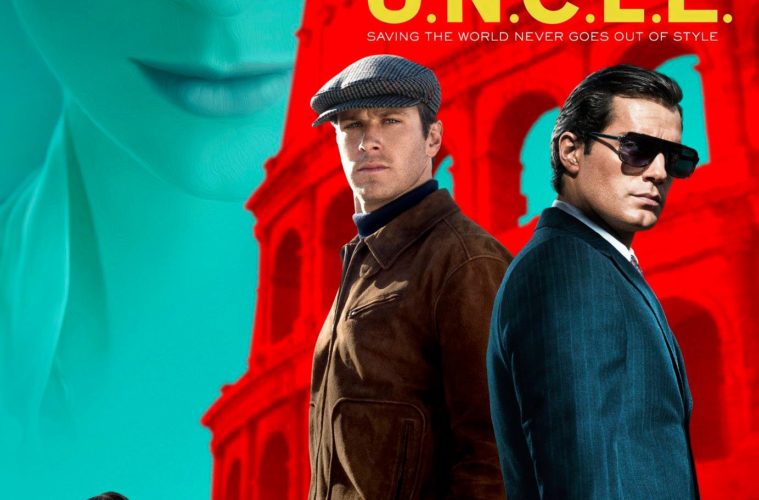The freewheeling, frothy tone of Guy Ritchie’s The Man from U.N.C.L.E. fits in perfectly with what has, so far, been a year full of light-as-air spy films. James Bond’s latest, Spectre, looks to buck that trend come the fall, but right now silly hit-and-run action antics are the name of the game. From watching Tom Cruise once more prove a one man army in the slap-dash Rogue Nation, to Colin Firth dispatching baddies with a smirk and a bespoken suit in Kingsman, there’s been a most welcome return to the breezier, more stylish concerns of older spy fare. Eventually Ritchie was going to get in on the game, and the result is just about what we’d expect. Moreso than the other recent entries, U.N.C.L.E. is positively in love with the deep-down roots of the genre and the era that spawned them.
You need not have seen a single episode of the TV show that spawned it–or even read a Wikipedia entry for that matter–in order to get up-to-speed with this U.N.C.L.E. The plot is a mostly recycled trinket, and while the characters are largely faithful to their counterparts, played then by Robert Vaughn and David McCallum, there’s nothing here a modern audience won’t be at least vaguely familiar with. Which is where Ritchie comes in, because while he may be more than happy to let the plot fly in a broad, half-realized form, he’s anything-but-vague in regards to fetishizing that forgotten world of long-ago spycraft that was popularized by Ian Fleming. Style is the substance in most of Ritchie’s film, and here he indulges to the point we are almost willing to believe that the Cold War era of international intrigue and clandestine intel looked more like this, and less like, say, Tinker, Tailor, Soldier, Spy.

Not that Ritchie, his technicians, or his actors ever get bogged down in making any.thing seem realistic; it’s that they manage to give the film an air of relaxed cool in its atmosphere that feels genuine. There’s a deeply superficial ethos going on here, but it works for the world on display; every costume, every set, and every flashy car has been perfectly placed to create that necessary illusion; all of the toys are more important than the people. That, also, is of course the film’s biggest weakness, preventing it from be anything other than a quick flirtation. The entire confection may have fared better nearly twenty years ago; Warner Bros would have rejoiced to have U.N.C.L.E. over small-screen makeover disasters like Uma Thurman’s The Avengers and Wild, Wild West.
Henry Cavill stars as CIA operative Napoleon Solo, and he’s once again saddled with an uncomfortable American accent that seemingly stilts his performance. His co-star, Armie Hammer would have likely handled the CIA man with tongue-in-cheek swagger, but no, he’s KGB loose-cannon Illya Kuryakin, wrangling an awfully colorful Russian accent much more successfully than he wrangled baddies in The Lone Ranger. Together these two form the usual unlikely comrades who come to realize that they have the same mission after initially assuming the other is an adversary. The mission they team up on, involving stolen nuclear weapons and screwy Nazi scientists, is boilerplate action nonsense, but its just sturdy enough to let Ritchie play back-and-forth with their questionably repressed dynamic. If only Cavill and Hammer had more of the necessary charisma to match the rest of the style; both men capture the nonchalance and derring-do just fine, but they don’t quite have the star power and natural energy shining through that makes the best of this genre really work.

The women in the picture fare much better, effortlessly and sleekly integrating into the overall picture Ritchie is trying to paint. Alicia Vikander emerges here as both sexy and commanding. Her Gaby, a defector from Germany, doesn’t just keep up with the boys, she consistently takes the wind out of their sails, and then scoots them back in the direction of the story. She’s even got another great dance scene, sashaying seductively to “Call to Me” even as Hammer seems not to notice. Matching Vikander in the liveliness department, but in a different key, is Elizabeth Debicki as the villainous Victoria Vinciguerra, Italian royalty whose plans are sinister on a global level. Debicki was a revelation as Jordan Baker in Baz Luhrman’s The Great Gatsby, and she reconnects to that classical, old Hollywood charm here. Victoria proves to be the most interesting of the recent megalomaniacal pseudo-Bond villains, and I’d take her Hepburn-esque haughtiness over Sam Jackson’s kidding lisp any day.
Ritchie blithely sails along trotting out his bag of tricks, and delivers some exciting car chases and split-screen action interludes that dial-down a little on his usual stylistic crutches, but fit organically into the movie. At some point, though, U.N.C.L.E. becomes so inconsequential, that it threatens to shrug itself right off screen. I found myself enjoying the tone and the effort, but it never really coalesces, which turns out be almost as self-defeating as Kingsman’s violent tonal shift in its third act. U.N.C.L.E. is, in many ways, too much like the spies it depicts; easy on the eyes, smooth and mysterious, and then you can’t seem to recall a single thing about it in the morning.
The Man From U.N.C.L.E. is now playing in wide release.

